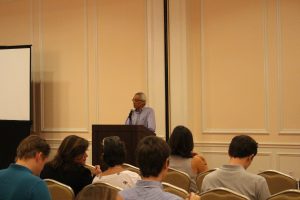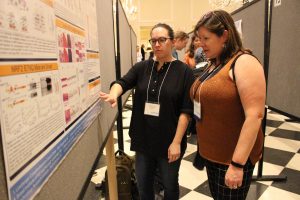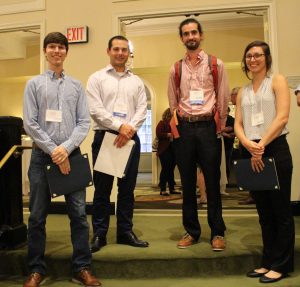Two scientists who trained in laboratories at the University of North Carolina at Chapel Hill returned to campus for UNC Lineberger’s 44th Annual Postdoc-Faculty Research Day to share lessons from their careers.

Katherine Fries, PhD, deputy director in the Global Clinical Immunology department at Sanofi Pasteur, and Jennifer Gerton, PhD, investigator with the Stowers Institute for Medical Research in Kansas City, Missouri, spoke to as many as 125 people gathered at the Carolina Inn for a day of research presentations from the center’s postdoctoral research associates.
In addition to a research presentation competition by UNC Lineberger trainees, the day included a scientific poster competition for postdoctoral associates and graduate students.
A formative experience
“This place was really formative to me in my career,” said Gerton, who described her path from graduate school at Stanford University, to UNC-Chapel Hill for postdoctoral training, to establishing her own lab at the Stowers Institute.
Gerton said science is influenced by the times in which it is practiced. When she graduated from Stanford, it was around the time that the first genome was sequenced. She went on to focus on genomic instability, which is often associated with cancer.
At UNC-Chapel Hill, she worked in the lab of Thomas Petes, PhD, a former UNC Lineberger member and professor of biology at UNC-Chapel Hill. She described her work to understand the role of proteins called cohesins, which maintain the integrity of chromosomes. Gerton said that a gene called STAG2 is highly mutated in a number of cancers, and codes for a section of DNA that codes for a sub-unit of this protein complex.
Her work may help elucidate how loss of cohesin function can lead to a developmental disorder called Cornelia de Lange syndrome.
“We’re continuing to work on this,” she said, speaking of a finding that cohesins play a role in maintaining stability of DNA during transcription.
Gerton issued a challenge to the emerging scientists in the audience to take science to the next level.
“Things are always evolving and changing, technologies are getting better – this is a challenge for the next generation,” she said. “You guys are taking us forward and thinking about things like genome instability in cancer in new ways.”
A mission-driven career
Fries said she has fond memories of her time as a graduate student and postdoctoral associate at UNC Lineberger, working in the lab of Nancy Raab-Traub, PhD, an adjunct professor in the UNC School of Medicine Department of Microbiology & Immunology.

The center is “filled with excellent scientists,” she said, who “build on each other’s ideas and build great collaborations.”
She described the path she took to her current position within the Global Clinical Immunology Department at Sanofi Pasteur. She said her group focuses on developing, optimizing and validating test methods for clinical studies to support vaccine licensure. She noted that she was involved in working on a test to evaluate novel vaccines the company was making in Europe at the time of the 2009 H1N1 global pandemic.
It was when she was a freshman in college that Fries said her interest was sparked in science and public health. One of her classmates, a biology major, died from bacterial meningitis. That had a big impact on her.
Now as a mother, she said she values the importance of vaccine to protect against meningitis. The U.S. Centers for Disease Control and Prevention recommends meningococcal vaccination for adolescents.
Fries said that another formative event occurred during her sophomore year of college. She worked at a vaccine company that had licensed a vaccine for haemophilus influenzae type B in infants. According to the CDC, Hib disease was the leading cause of bacterial meningitis in children under 5 years old in the United States before the vaccine was developed.
At UNC-Chapel Hill, her work included a study of the Epstein Barr-virus oncogene in the development of nasopharyngeal cancer. She later held a series of other roles, including as a postdoc at the CDC.
Fries said she was looking for a way that her work could be applied to public health, and she found she could identify with the mission of Sanofi Pasteur.
“Five lives are saved every 60 seconds by a vaccine worldwide,” she said, yet still, lives are lost to preventable diseases. “I think we’ve become so successful at eliminating or severely reducing a lot of these infectious diseases, there’s been a lot of people who are forgetting the value of these vaccines,” she added.
Honoring UNC Lineberger postdocs and graduate students
The day also included presentations by UNC Lineberger’s trainees, and a poster competition.
Two of UNC Lineberger’s postdoctoral research associates, Clint Stalnecker, PhD, and Jarod Waybright, PhD, received first place in an oral research presentation competition. They were selected from among all of the postdoctoral research associates who gave oral presentations on their research.

Stalnecker is a member of the lab of UNC Lineberger’s Channing Der, PhD, Kenan Distinguished Professor in the Department of Pharmacology, and Waybright is a member of the lab of Lindsey James, PhD, assistant professor in the UNC Eshelman School of Pharmacy.
Three postdoctoral research associates were awarded prizes in a scientific poster competition: David Thieker, PhD, received first place; James Kemp, PhD, received second place; and Sara Gibson, PhD, received third place.
Sandra Zarmer was awarded the prize for the best graduate student poster.
